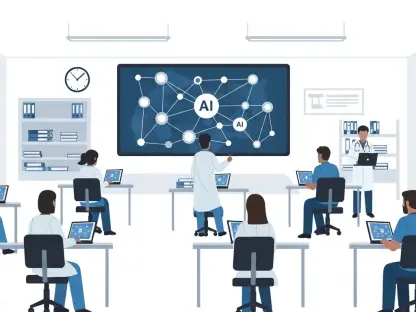Today, we’re thrilled to sit down with Faisal Zain, a renowned healthcare expert with a deep focus on medical technology. With years of experience in the manufacturing of medical devices for diagnostics and treatment, Faisal has been at the forefront of driving innovation in this rapidly evolving field. In this interview, we explore the intersection of artificial intelligence and healthcare, diving into the motivations behind new initiatives in digital health, the critical role of physicians in shaping technology, and the challenges and opportunities that lie ahead in integrating AI into clinical practice. Join us as we uncover Faisal’s insights on how these advancements can transform patient care while addressing the concerns of medical professionals.
What inspired the recent push for centralized efforts in digital health and AI within the healthcare industry?
I think the inspiration comes from a growing recognition of how fast technology, especially AI, is changing the healthcare landscape. Over the past couple of years, there’s been intense study into how doctors are already using AI, and the findings show both promise and gaps. Many organizations have realized that without a dedicated focus, we risk missing out on AI’s full potential or, worse, creating tools that don’t fit real-world medical needs. The drive is to bridge those gaps—ensuring technology aligns with clinical practice and addresses unmet needs like workflow efficiency and patient outcomes.
How has the feedback from physicians over recent years influenced these initiatives?
Physicians’ feedback has been absolutely critical. Surveys and studies show a mix of excitement and concern among doctors about AI. Many see the potential for better diagnostics or personalized care, but there’s also worry about things like data privacy and whether these tools are reliable enough for high-stakes decisions. This feedback has pushed the industry to create frameworks and centers that prioritize physician input, ensuring that AI tools are practical, safe, and truly supportive of the doctor-patient relationship rather than a burden.
Why is it so crucial for physicians to play a central role in shaping AI and digital health technologies?
Physicians are the ones on the front lines, so they understand the nuances of patient care and clinical workflows better than anyone. Without their input, tech developers might create solutions that look great on paper but fall apart in a real hospital or clinic setting. For instance, a tool might be technically impressive but too cumbersome to use during a busy shift. Having doctors involved ensures that AI enhances care rather than complicates it, and it helps avoid unintended consequences like misdiagnosis or breaches in patient trust.
What are some of the major concerns physicians have about adopting AI in their practices?
A significant number of doctors are more worried than excited about AI, and their concerns often center on a few key issues. Data privacy is a big one—patients’ information is incredibly sensitive, and there’s fear about how AI systems handle that. Then there’s the question of reliability and safety; if an AI tool gives a wrong recommendation, who’s accountable? There’s also a general unease about whether these tools will really integrate smoothly into their day-to-day work or just add more stress. These are valid worries that need to be addressed head-on.
How can the industry help alleviate fears around data privacy and the reliability of AI tools?
Tackling data privacy starts with robust policies and transparency. The industry needs to ensure that AI systems comply with strict regulations and that doctors and patients know exactly how data is used and protected. As for reliability, it’s about rigorous testing and validation before any tool hits the market, plus ongoing monitoring once it’s in use. Training programs can also help physicians understand AI’s limitations and strengths, so they feel confident using it as a support tool rather than a replacement for their judgment.
What do you see as the most exciting untapped opportunities for AI in healthcare right now?
We’re really just at the beginning of what AI can do in healthcare. One huge opportunity is in predictive analytics—using AI to spot patterns in patient data that could predict conditions like heart disease or diabetes before symptoms even show up. Another is in personalizing treatments; AI can analyze a patient’s unique profile to suggest the best therapy or medication. These advancements could revolutionize how we approach prevention and care, making medicine more proactive and tailored to each individual.
Can you share an example of how AI might transform patient care in the near future?
Absolutely. Imagine a scenario where AI is integrated into a hospital’s electronic health record system. It could continuously monitor a patient’s vitals and medical history, flagging subtle signs of deterioration—say, an early infection—before a doctor or nurse might notice. This early warning could prompt quicker interventions, potentially saving lives. It’s not about replacing human care but amplifying it, giving clinicians a powerful tool to act faster and more precisely.
What’s driving the rapid increase in AI adoption among physicians in recent years?
The rapid adoption comes down to a few factors. First, the technology is becoming more accessible and user-friendly, so doctors don’t need to be tech experts to use it. Second, there’s growing evidence that AI can save time on tasks like documentation or analyzing scans, which is a huge draw for overworked physicians. Finally, the success stories—cases where AI has directly improved outcomes—are spreading, creating a ripple effect of enthusiasm and willingness to try these tools out.
How do partnerships with regulators, policymakers, and tech leaders contribute to the responsible development of AI in healthcare?
These partnerships are essential because AI in healthcare isn’t just a tech issue—it’s a societal one. Regulators and policymakers help set standards for safety and ethics, ensuring AI tools don’t harm patients or violate privacy. Tech leaders bring the innovation and scalability, while healthcare experts ground the development in clinical reality. Together, they can create benchmarks and policies that balance innovation with accountability, making sure AI serves patients and doctors without cutting corners.
What is your forecast for the role of AI in healthcare over the next decade?
I believe AI will become an integral part of healthcare, almost like a trusted assistant to physicians. Over the next decade, I expect we’ll see it seamlessly woven into clinical workflows, helping with everything from diagnosis to treatment planning. But the key will be trust—building systems that doctors and patients feel confident in. If we get the balance right between innovation and oversight, AI could significantly reduce healthcare disparities, improve outcomes, and make care more efficient. It’s an exciting time, but it’ll require careful navigation to get there.









